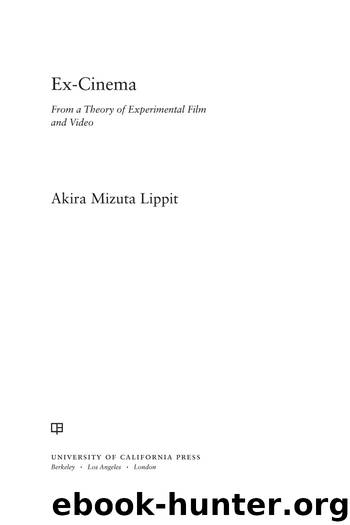Ex-Cinema by Lippit Akira Mizuta

Author:Lippit, Akira Mizuta
Language: eng
Format: epub
ISBN: 9780520953918
Publisher: University of California Press
In order to be absolutely foreign to the visible and even to the potentially visible, to the possibility of the visible, this invisibility would still inhabit the visible, or rather, it would come to haunt it to the point of being confused with it, in order to assure, from the specter of this very impossibility, its most proper resource. The visible as such would be invisible, not as visibility, the phenomenality or essence of the visible, but as the singular body of the visible itself, right on the visible—so that, by emanation, and as if it were secreting its own medium, the visible would produce blindness.17
The visibility that Derrida imagines secretes its own medium, its own form, and engenders a mode of spectatorship, blindness, intrinsic to it. Blindness, says Derrida, is an effect of the invisibility of the visible as such. Absolute invisibility inhabits the visible, living in and living on or after the visible as blindness. Visibility secretes invisibility, “as if it were secreting its own medium,” producing blindness. The subject of Derrida’s secret and secreted medium is blind. The invisibility that Derrida sees is not an aspect of visibility, neither a phenomenon nor an essence of the visible: it is an image that inhabits or haunts the visible right on the visible. Visible and invisible are not antitheses of visuality as such, inversions of an economy. They are positive forms of the image—visible and invisible images—superimposed over one another and generating a secret medium and unique blindness. A seeing blindness.
The phenomenon of blindness remains bound to the subject of autobiography in much of Derrida’s thought. Blindness appears for Derrida not as the absence of sight but as a particular relationship to oneself, to the image of oneself; it is an autobiographical condition, a configuration of the regard and a mode of self-regarding: that is, blindness is conditional. It generates a specific mode of insight. For Derrida, blindness is also bound, as is autobiography, to death.
Of his collaboration with Gary Hill and his exposure to video, Derrida says: “Seeing myself passing by reading in front of a camera against an absolutely white background that made me think, I don’t know why of the cemetery in Jerusalem seen from the Mount of Olives, I was all the more gravely passive in that I did not know what Gary Hill would do with what I saw myself doing without seeing myself.”18 Derrida connects this moment of autobiographical blindness to “the cemetery in Jerusalem,” which he projects against the white screen. But also to passion and love: passion, he says, “in the sense that right away I loved it, that is to say, as always when one loves, I right away wondered why I loved that, what or whom I loved exactly.”19 Passion is forged for Derrida by an experience of love, but also of passing, passing away, the loss of oneself in the other, acutely in the death of another, but also in the passive scenes of autobiography and blindness provoked in the passing of another.
Download
This site does not store any files on its server. We only index and link to content provided by other sites. Please contact the content providers to delete copyright contents if any and email us, we'll remove relevant links or contents immediately.
The Kite Runner by Khaled Hosseini(5153)
Gerald's Game by Stephen King(4624)
Dialogue by Robert McKee(4374)
The Perils of Being Moderately Famous by Soha Ali Khan(4204)
The 101 Dalmatians by Dodie Smith(3495)
Story: Substance, Structure, Style and the Principles of Screenwriting by Robert McKee(3446)
The Pixar Touch by David A. Price(3419)
Confessions of a Video Vixen by Karrine Steffans(3288)
How Music Works by David Byrne(3246)
Harry Potter 4 - Harry Potter and The Goblet of Fire by J.K.Rowling(3046)
Fantastic Beasts: The Crimes of Grindelwald by J. K. Rowling(3042)
Slugfest by Reed Tucker(2987)
The Mental Game of Writing: How to Overcome Obstacles, Stay Creative and Productive, and Free Your Mind for Success by James Scott Bell(2888)
4 - Harry Potter and the Goblet of Fire by J.K. Rowling(2692)
Screenplay: The Foundations of Screenwriting by Syd Field(2619)
The Complete H. P. Lovecraft Reader by H.P. Lovecraft(2543)
Scandals of Classic Hollywood: Sex, Deviance, and Drama from the Golden Age of American Cinema by Anne Helen Petersen(2505)
Wildflower by Drew Barrymore(2481)
Robin by Dave Itzkoff(2427)
